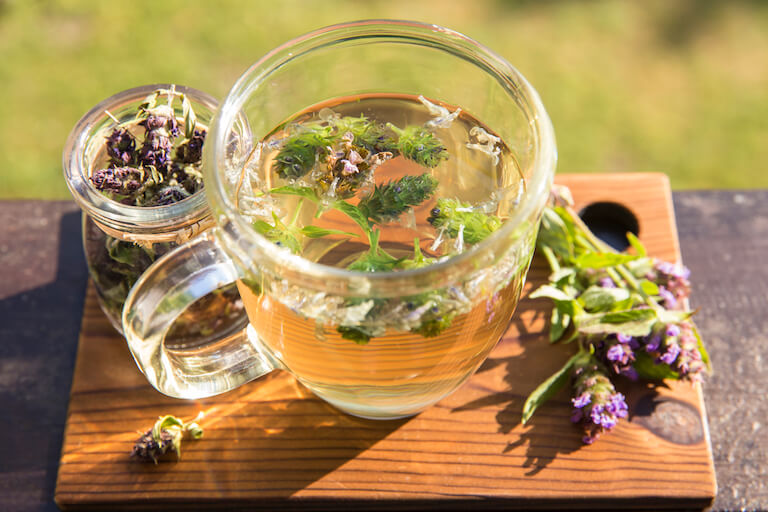Women experience a range of health fluctuations throughout the month, influenced by hormonal changes that can cause symptoms like menstrual cramps, mood swings, fatigue, and bloating. These natural variations can significantly impact daily life, but incorporating herbal supplements can offer valuable support. By understanding and using specific herbs, you can manage these monthly changes more effectively, helping you feel balanced and experience lessened symptoms of these common hormonal changes.
Navigating Women’s Health: Understanding Hormonal Challenges and Natural Remedies
Women encounter a range of unique health challenges due to natural hormonal fluctuations experienced throughout life, from PMS to menopause. On top of that, many deal with further fluctuation due to various conditions like PCOS (polycystic ovary syndrome), endometriosis, and thyroid disorders, to name a few.

These conditions, as well as various factors like taking hormonal contraceptives and environmental toxins in our daily lives, can contribute to hormonal fluctuations that can range from tolerable to unbearable for many women.
This is why it is so valuable to understand that various herbs can help bridge the gap and help balance hormonal fluctuations so you can feel more in control of your health on a day-to-day basis.
Essential Herbs and Their Benefits for Hormonal Imbalances
Understanding the impact of hormonal imbalances is the first step toward managing them effectively. Fortunately, various herbs offer natural support to help balance these fluctuations, making it easier to maintain your well-being. Here are some essential herbs and their specific benefits for women’s health:
- Turmeric: Known for its potent anti-inflammatory properties, turmeric helps reduce inflammation associated with various health conditions. It is particularly beneficial for women suffering from joint pain, menstrual cramps, and chronic conditions like arthritis.
- Ashwagandha: This adaptogen assists in managing stress and anxiety, making it a valuable herb for those dealing with stress-related hormonal imbalances. Ashwagandha supports adrenal health and can help stabilize mood swings.
- Red Raspberry Leaf: Rich in iron, calcium, and vitamins B and C, red raspberry leaf is excellent for menstrual health. It tones the uterus, which can ease menstrual cramps and regulate heavy bleeding.
- Chasteberry (Vitex agnus-castus): Chasteberry influences hormonal balance, particularly in regulating the menstrual cycle. It can alleviate PMS symptoms such as breast tenderness, cramps, and mood swings.
- Dong Quai (Angelica sinensis): Often called the “female ginseng,” Dong Quai is used in traditional Chinese medicine to enhance blood health, balance estrogen levels, and ease menopausal symptoms like hot flashes.
- Fennel (Foeniculum vulgare): Fennel is beneficial for hormonal balance and PMS relief, particularly in alleviating bloating menstrual cramps and improving digestion.
- Black Cohosh (Actaea racemosa): This herb is commonly used to mitigate menopausal symptoms, including hot flashes, night sweats, and mood swings. It’s also used for menstrual discomfort.
- Evening Primrose Oil: High in gamma-linolenic acid (GLA), supports overall hormonal balance, and helps alleviate PMS symptoms like breast tenderness and mood fluctuations.
Practical Tips for Incorporating Herbs into Daily Life
Integrating beneficial herbs into your daily routine can be both simple and effective. By doing so, you can consistently support your body’s natural balance and address specific health concerns. It, however, is crucial that you work with your doctor or naturopath before taking some of these herbs if you are on medications.
Whether you prefer drinking herbal teas, taking supplements, or using other forms of herbal products, there are numerous ways to make these powerful plants a part of your everyday life. Here are some practical tips to get you started:
- Teas and Infusions: Many herbs, such as red raspberry leaf and fennel, can be enjoyed as teas. These provide health benefits and a comforting and hydrating way to start or end your day. Brewing your herbs as teas or infusions allows you to integrate their beneficial properties into your daily routine easily.
- Supplements: For those who prefer convenience, herbal supplements in the form of capsules or tinctures are a great option. Herbs like turmeric and ashwagandha can easily be incorporated into your daily regimen in this way. Supplements offer a concentrated dose of the herbs’ active compounds, making them an efficient choice for busy lifestyles.
- Quality Products: Choosing high-quality, standardized herbal products is essential to ensure you are getting the most effective and pure supplements. Reputable sources such as Whole Body Support or Earthley Wellness are known for their quality and effectiveness. Always look for products that have been tested for potency and purity to get the best results.
- Consultation with Functional Medicine Provider: It is crucial to meet with a functional medicine practitioner when considering adding herbal supplements to your daily regimen, especially if you are taking other medications or supplements to ensure they can be safely taken together.
Getting the Best from Your Herbal Regimen
Before starting any new herbal regimen, it’s essential to consult with a healthcare professional. This ensures that your chosen herbs are appropriate for your specific health needs and conditions. Experts like Dr. Tony Aboudib at Hyperbaric Wellness Center can provide personalized guidance and help you make informed decisions.
It’s also important to select certified herbal products for quality and consistency. We recommend Whole Body Support, a brand hand-picked for quality by Dr. Tony, designed to support various health needs. Another excellent option is Earthley Wellness, an affordable brand offering tinctures and herbal remedies that undergo significant quality testing to ensure their efficacy and safety.
Choosing reputable brands like these ensures that you get pure and effective supplements, which can significantly impact your health outcomes. Always look for products that have been tested for potency and safety to ensure you are using the best possible options for your well-being.
Your Path Towards More Balanced Health
Incorporating herbal supplements into your daily routine can bring about significant changes in your life, especially if you’re dealing with hormonal imbalances. Imagine reducing the severity of PMS symptoms, experiencing more regular menstrual cycles, and managing the debilitating pain of conditions like endometriosis more effectively.
These changes can lead to a more stable mood, increased energy levels, and improved overall well-being. For many women, this means reclaiming control over their lives and alleviating the daily discomforts that hormonal imbalances can cause.
Herbal supplements can bridge the gap where traditional treatments may fall short, offering a natural and holistic approach to managing your health.
To get personalized advice and find out which herbs are best for you, schedule a free consultation with Dr. Tony Aboudib at Hyperbaric Wellness Center. Understanding your unique health needs is the first step toward feeling your best daily.
Disclaimer: The information provided in our blog posts is for educational and informational purposes only and is not intended as medical advice. While we strive to share knowledge and insights on health-related topics, this content should not be used as a substitute for professional medical advice, diagnosis, or treatment. Always consult with a qualified healthcare professional regarding any medical concerns or decisions related to your health and well-being.
Resources:
[1] Altınterim, B. (2014). Effects of herbs on Hypothalamic-PituitaryGonadal (HPG) axis and Hypothalamic-PituitaryAdrenal (HPA) axis. https://www.semanticscholar.org/paper/53a0321bf44c2b1710b159632568a18228e8fdf2
[2] Black cohosh and chasteberry : herbs valued by women for centuries. (2000). https://www.semanticscholar.org/paper/dcc537a8da60cde7b0f5cecb701c2e161b62ac88
[3] Itrat, N. (2020). Herbs and spices as natural medicine for treatment of metabolic disorders. https://www.semanticscholar.org/paper/d1278d7404507fb3af36cd06dccaa54ee319310d
[4] Layacha, S. Y., & Biswas, D. A. (2023). Women With Polycystic Ovary Syndrome: A Review of Susceptibility to Type 2 Diabetes. Cureus, 15(1), e33390. https://doi.org/10.7759/cureus.33390
[5] Meena, S., & Meena, P. K. (2023). The Healing potential of Nidra in Ayurvedic Medicine: A comprehensive overview. https://www.semanticscholar.org/paper/122aae8602230662a83d990786bf6bbfa62a458c
[6] Minocha, N., Rao, K., Yadav, N., & Bansal, N. (2023). Essential Herbal Plants for the Clinical Management of Polycystic Ovary Syndrome and Patents for the same. https://www.semanticscholar.org/paper/c1bf73905d6c3cb24a6bbdc0f889438a2ebe1397
[7] Nirmala, A., & Prabhu, A. (2023). Knowledge Regarding Endometriosis and Wellbeing among Women Diagnosed with Endometriosis. https://www.semanticscholar.org/paper/Knowledge-Regarding-Endometriosis-and-Wellbeing-Ms.AnnieNirmala-Mrs.AnusuyaPrabhu/d1700e74e199cfba6e686c93cfaa6cade76dea71

